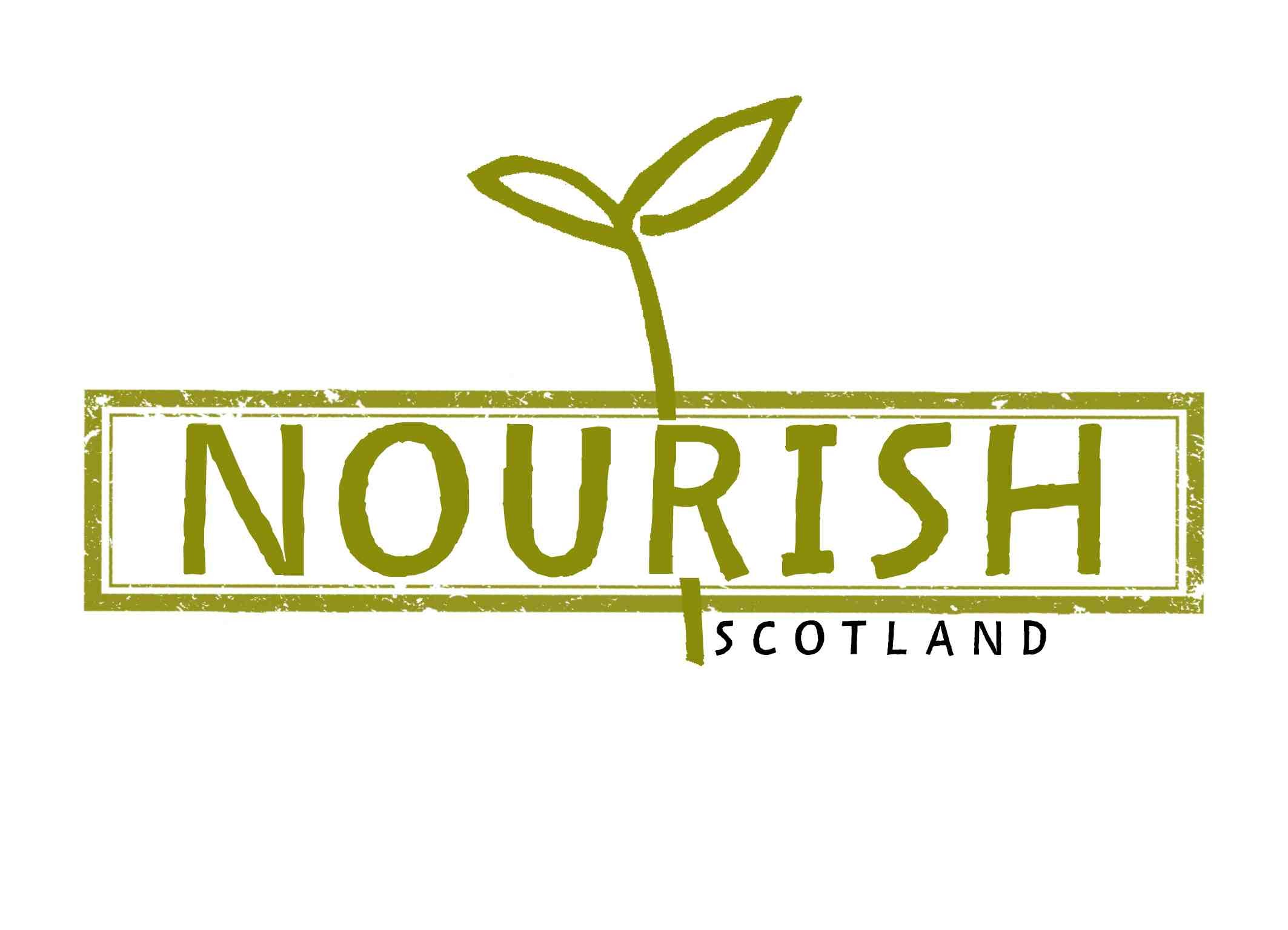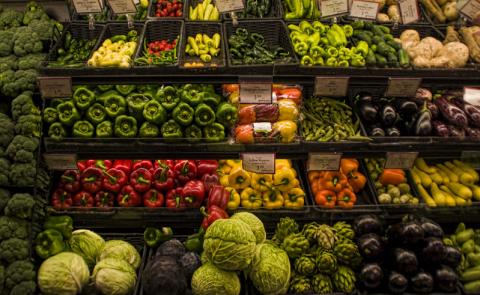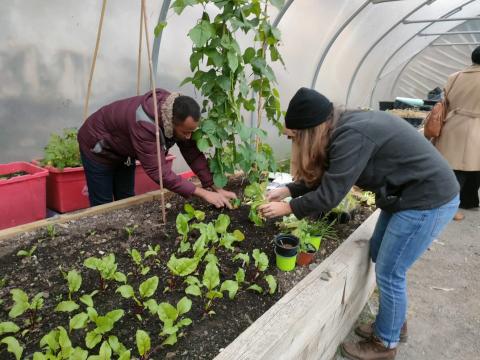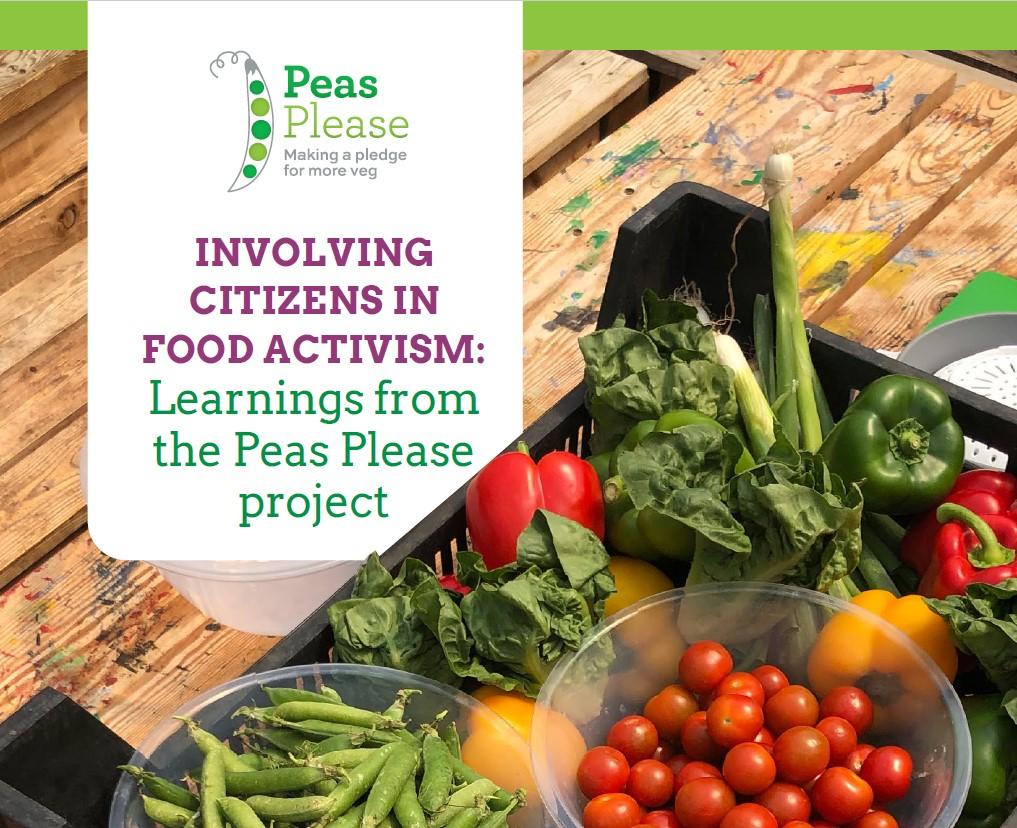
Involving Citizens in Food Activism
Peas Please launched the Veg Advocate programme in March 2020 to help us achieve our mission to make it easier for everyone to eat more Veg. In this report we showcase the amazing work of our Veg Advocates and share what we’ve learnt from involving citizens in food activism.
Involving Citizens in Food Activism: Digital report
The Peas Please initiative set out with a clear mission: to make it easier for everyone in the UK to eat more veg. This mission remains important: between 2016 and 2019, 12% of people over 16 were eating less than one portion of veg a day, rising to 23% for those aged 11-16 years old, and 29% for children aged 5-10 years old. Eating more veg has benefits for our health, the environment, and the economy.
To help us achieve this mission, the Peas Please partners – The Food Foundation, Nourish Scotland, Nourish NI and Food Sense Wales – launched the Veg Advocate programme in March 2020. Our aim was to involve citizens as part of the wider work undertaken by Peas Please, based on the knowledge that we can better understand the barriers that people face in accessing veg through grassroots involvement, listening to people, and working with them to identify solutions.
Initially engaging 180 volunteers from across the UK, we aimed to understand what citizens believed it would take to make it easier for people to eat more veg. Specifically, the programme set out to:
- Create opportunities for Veg Advocates to share their voices and lived experiences with businesses and policy makers, and to create food system change that is relevant and impactful.
- Stimulate new and innovative action on veg in their communities.
- Create a new generation of food system agents of change, through forming networks and cultivating advocacy.
In this report, we will showcase some of the work Veg Advocates across the UK have been doing to influence business practice and to help increase veg consumption in their local communities. We also look at how a network of food activists has formed. In each of these sections, we will be asking two questions:
- What do Veg Advocates think needs to happen to make it easier for everyone to eat more veg?
- What have we learnt about how to meaningfully involve citizens? We hope that our learnings can help shape and drive other citizen-led food activism programmes in the future.
We hope that our learnings can help shape and drive other citizen-led food activism programmes in the future.
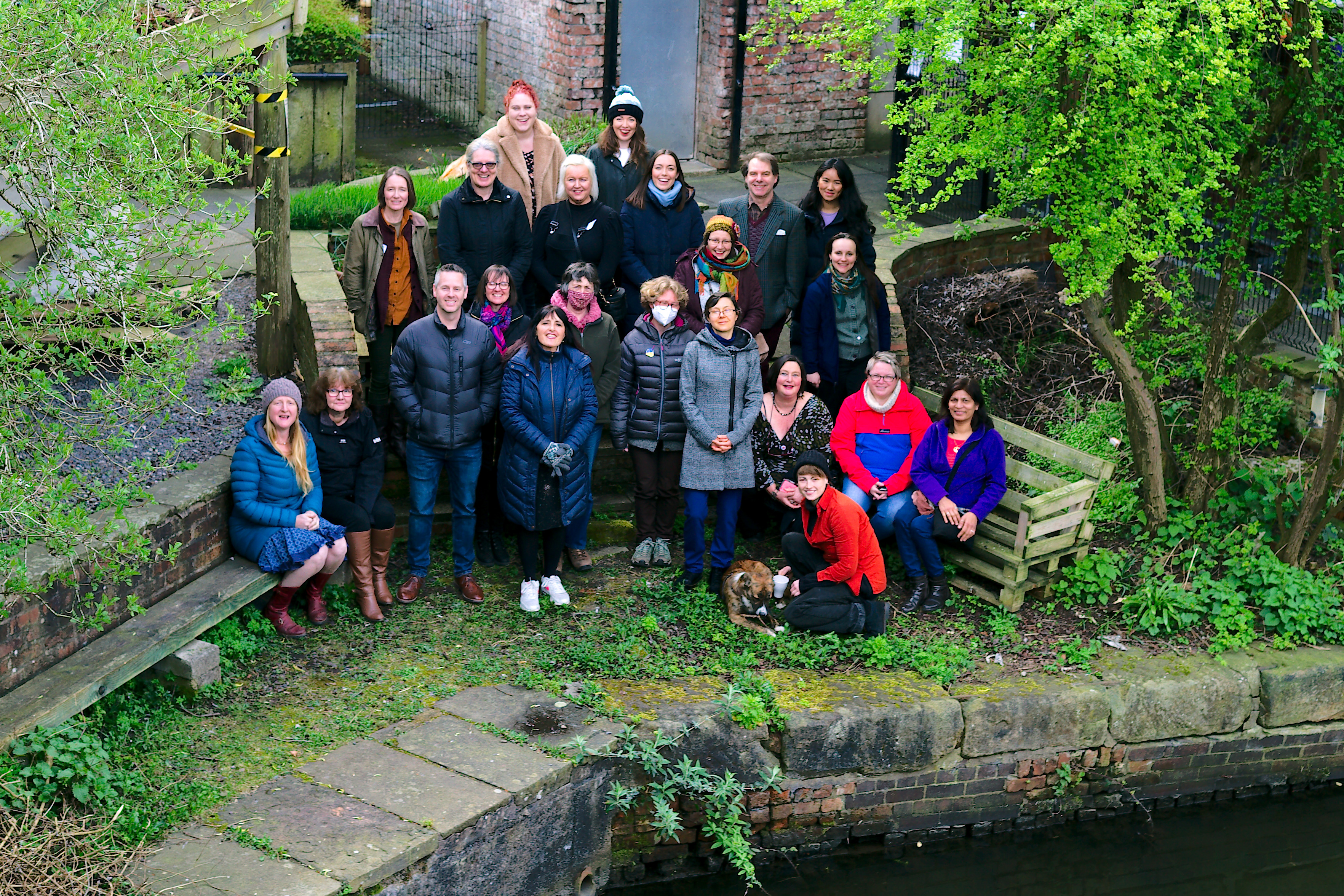
Summary: Successes and Learnings
Key Successes of the Veg Advocate programme:
Bringing communities together through veg:
- Our Small Grants Programme funded 54 local projects aimed at increasing veg consumption.
-
88 Veg Advocates were involved in delivering these projects.
-
Their activities reached approximately 2,700 people across the UK.
-
At least 17 activities have plans in place to continue beyond the programme ending.
Engaging businesses and citizens in conversations about veg:
-
36 Veg Advocates visited 50 supermarkets to assess how well they were meeting their Peas Please pledge.
-
24 Veg Advocates also participated in dialogues with representatives from food manufacturers and supermarkets, suggesting ways that they could better promote veg.
Creating a network: Veg Advocates report that one of the greatest benefits of the programme has been the opportunity to connect to other like-minded individuals. A number of Veg Advocates are now engaged in other work or volunteering roles that seek to improve the food system, including with Sustainable Food Places, Veg Cities and My Food Community.
Challenges:
-
Veg Advocates reported that whilst they recognised that community-level work is essential in promoting veg, others stated they would have valued more opportunities to be involved in policy advocacy efforts at a national level.
-
Delivering the small grants activities required time and a huge personal commitment from Veg Advocates. Four were not able to complete their activity and others, whilst pleased with the result, reported that the process was difficult and onerous at times.
-
Understanding the direct impact of citizen advocacy on business practice has been difficult to measure and feed back to Veg Advocates.
-
Veg Advocates are volunteers, committing their spare time and resources to this project, even in the face of the challenges brought on by the COVID-19 pandemic and changes to their personal circumstances. Understandably, not all Veg Advocates were engaged throughout the duration of the programme.
Sources for this report:
The content of this report is based on feedback and discussions with Veg Advocates throughout the programme. Our primary sources for quotes, case studies and key findings are:
-
Recorded or written feedback gathered from Veg Advocates following dialogues with food businesses and ‘invegstigations’ at Out of Home sector outlets.
-
Grant applications and evaluation forms from the Small Grant Programme.
-
Documentation of the Small Grants Programme carried out by 10 Veg Advocate ‘documenters’. This was a participatory process led by Veg Advocates which resulted in the production of four blogs, an online magazine and a presentation. Links to the documenters’ work have been included in section five – ‘Businesses Engagement.’
-
Evaluation carried out by City University including an onboarding survey, focus groups discussions and online food environment photo elicitation workshops.
The findings in this report are primarily qualitative and reflect the opinions, impressions or experiences of Veg Advocates. This report should not be treated as a systematic review of the challenges to veg consumption faced by these communities. However, it provides a useful insight into what citizens consider the barriers to be when accessing veg in their communities, and an exploration of what citizens can do to support each other to eat more veg.
To protect their identity, all quotes have been anonymised unless we have received consent.
Who are the Veg Advocates?
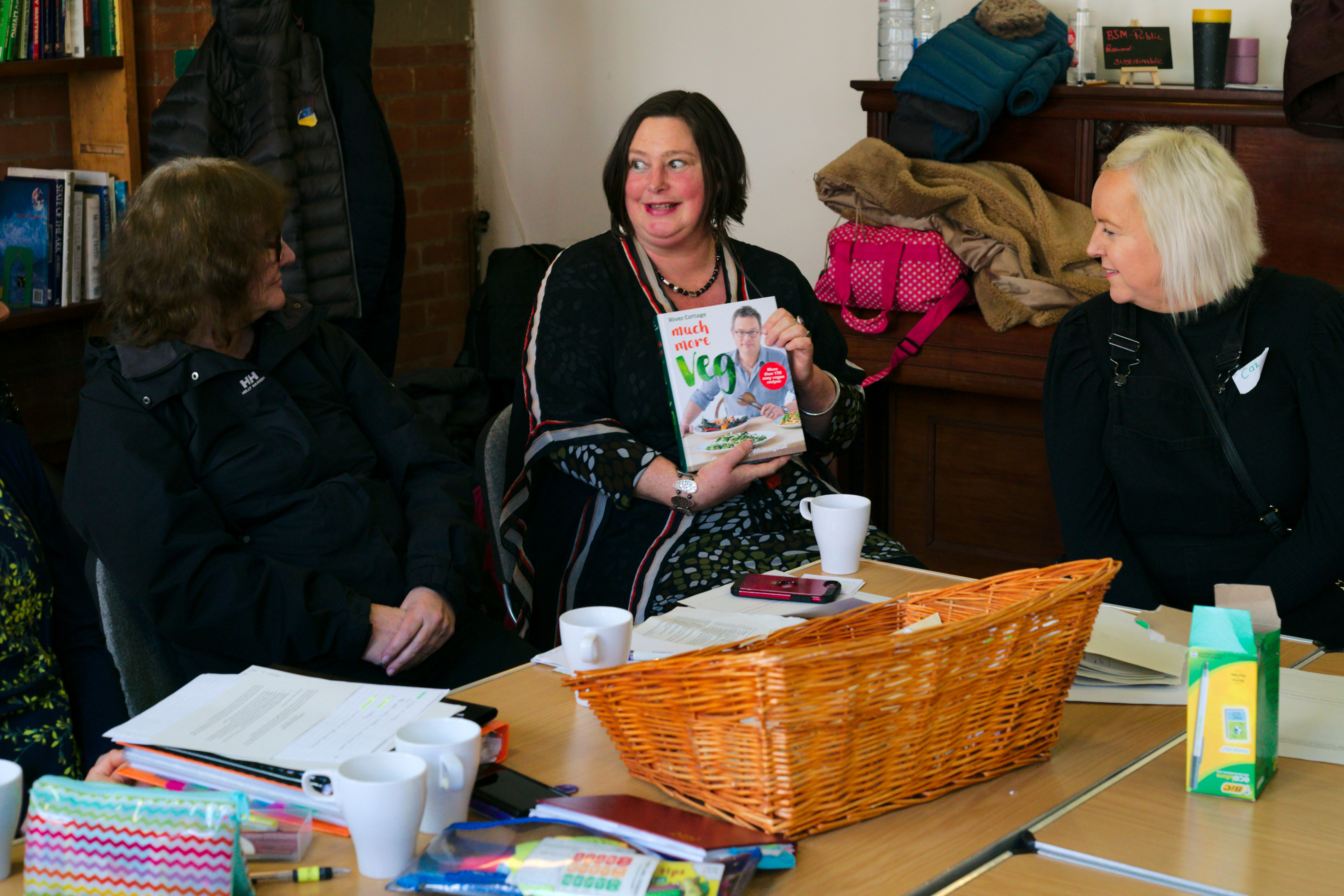
In 2021, we ran a survey with a random sample of our Veg Advocates to better understand their demographic profile. Our Veg Advocates are spread out across the UK: originally 48 from Scotland, 74 from England, 23 from Wales and 35 from Northern Ireland. Their ethnicity profile roughly aligns with that of the UK population (83% White, compared to 80.5% across the UK) (ONS, 2011). Just over half have a monthly household income lower than the UK average. The majority (94%) of our Veg Advocates are White females with the most popular age range the 36–45 category. This demographic profile may have been the result of changing our planned recruitment routes via community groups to online recruitment only (due to the lockdowns) or may simply be a reflection of the fact that our Veg Advocates are volunteers.
Timeline of the Veg Advocate Programme
Below is a summary of the main activities undertaken by the Veg Advocate programme
Veg in the Community - the Small Grants Programme
In March 2022 we launched the Small Grants programme, with the aim of supporting Veg Advocates to pilot new and innovative action on veg in their communities, or to scale-up existing activities.
We invited applications for events or activities which promoted, encouraged or made it easier for people to eat veg. The grant was deliberately not prescriptive – we wanted to hear from Veg Advocates about what they thought would work best in their local community.
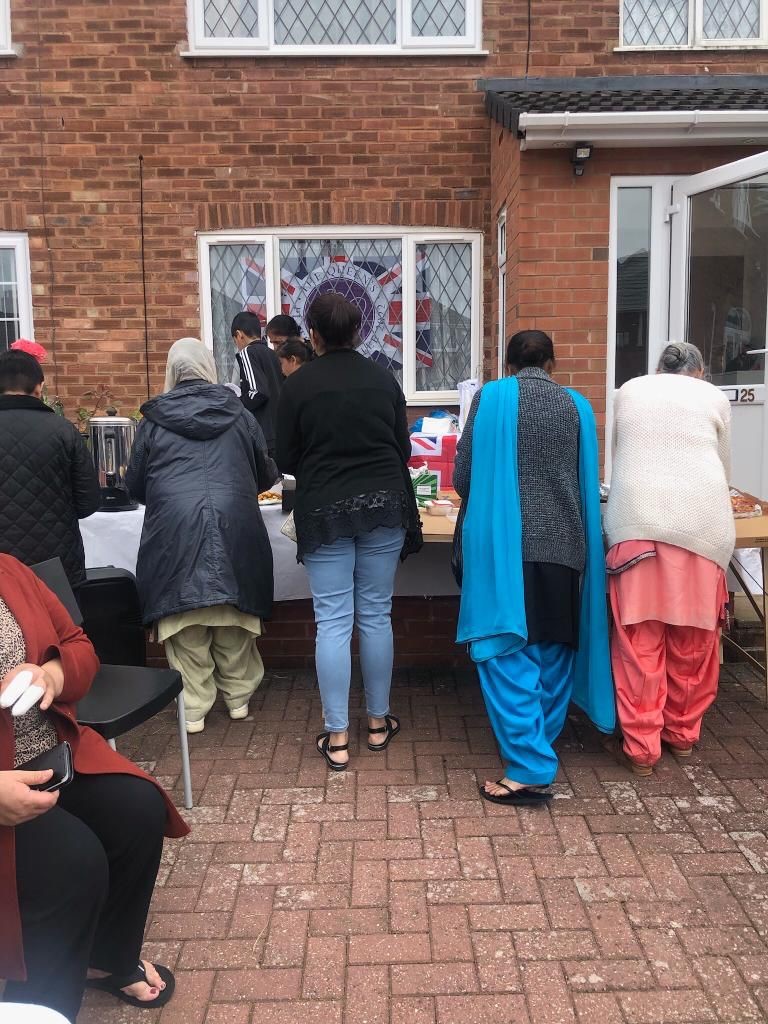
Between May 2022 and March 2023, 88 Veg Advocates were involved in delivering 54 activities across the UK. Each grant was £200 but in many areas Veg Advocates applied as a group, pooling their grant money to deliver an activity together. The money could be put towards activity costs (for example, seeds, technology, food), equipment (for example, induction hobs and other cooking equipment, durable gardening tools, compost stations etc.), other costs (e.g., expenses), or a combination of the three.
Although the grants were small – £200 per Veg Advocate – in focus groups, England and Scotland’s Veg Advocates told us that they valued the flexible approach of the Small Grants programme, which allowed Veg Advocates to be creative. Altogether these activities engaged over 2,700 people across the UK.*

In September 2022, a group of 10 Veg Advocates supported the People’s Engagement Officer in each nation to collect evaluation forms and feedback from Veg Advocates about the successes, challenges and learning from their small grant activities. They also produced engaging and creative blogs, presentations and e-zines, showcasing the work that took place across the UK. This participatory method of evaluation helped to cement connections between Veg Advocates, both within the group of documenters, and through the process of them reaching out to others. To compensate for their co-design of the documenting process, each documenter was given £500.
The findings below draw on the evaluation forms collected by the documenters, and summarised some of the case studies they produced. However, you can read these case studies in their original form and more examples of the Small Grants Activities here.
* The number of people reached through the Small Grants activities is based on estimates reported by Veg Advocates themselves and is not an exact figure. For some activities, such as stalls at events, it was not possible to record all the people who engaged with the activity.
Local community action: what do Veg Advocates think needs to happen to make it easier for everyone to eat more veg?
Many activities used multiple tools simultaneously for increasing the appeal and accessibility of veg, motivating individuals to eat more veg, or sharing knowledge about growing and cooking vegetables:
-
17 activities involved eating veg together, through communal meals that give people the chance to taste veg, increasing its appeal and kick-starting conversations about veg in welcoming environments.
-
29 activities aimed to promote veg through food education or knowledge sharing, including workshops and demonstrations on cooking skills, the health benefits of veg, or where and how to buy and cook veg on a budget. Nine of these activities produced resources including work booklets, a seasonal food leaflet and recipe cards.
-
14 included activities that aimed to connect people to veg through access to growing schemes.
-
Three activities sought to research and learn about the barriers to veg faced by community members, or methods that had successfully promoted veg in other areas, but many more mentioned how valuable bringing the community together had been for wellbeing, for starting conversations about food, and for creating peer-to-peer support that encourages healthy choices.
-
Nine of the activities aimed to connect people to local producers of veg or to support local supply chains

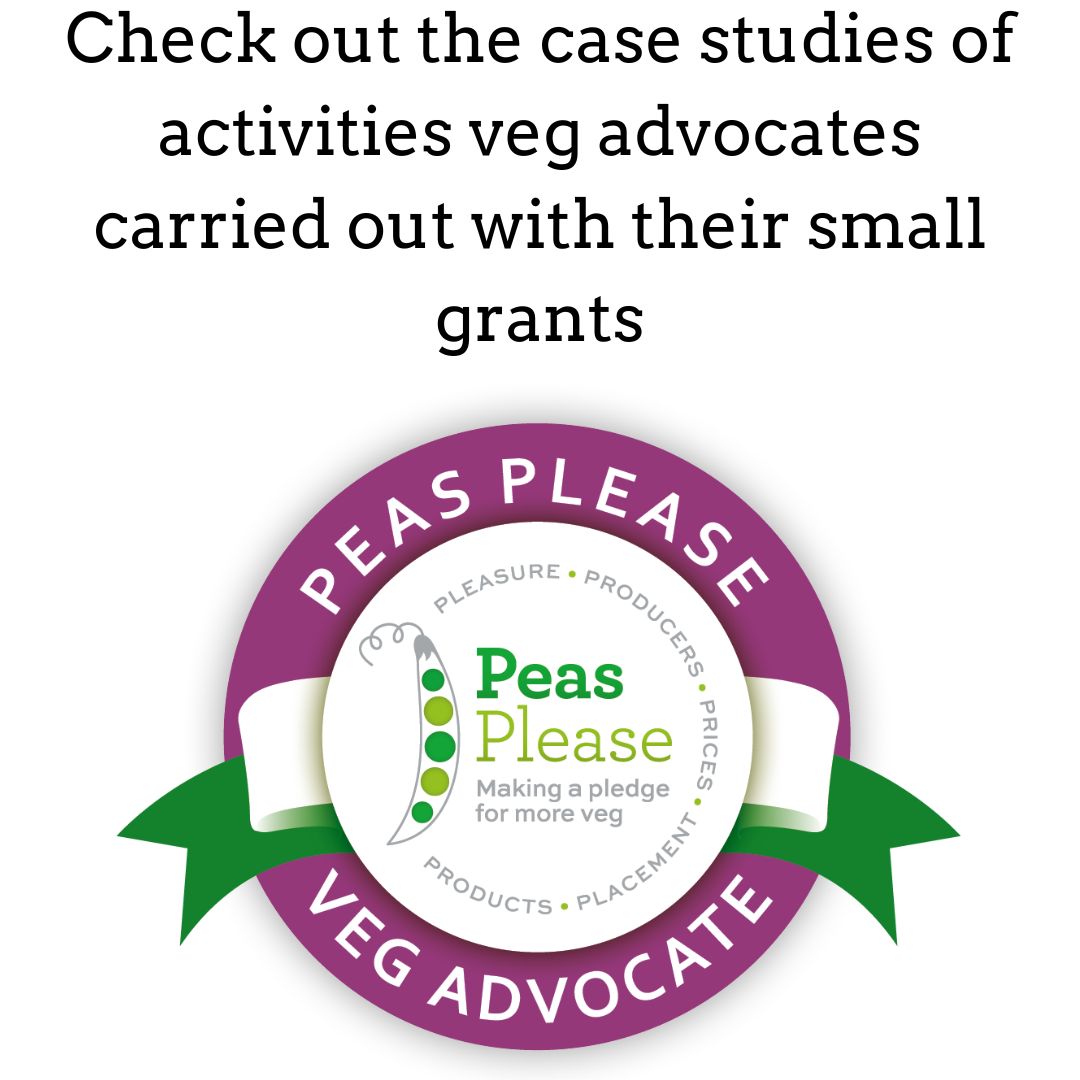
Veg Advocates in all four nations used their Small Grant to prepare meals that were eaten together in communal settings including community centres, homes, at street parties, in churches and community gardens. Altogether 17 activities included a free or pay-as-you like veg-filled meal as the main focus, or as part of a range of activities promoting veg, a further nine included tasting veg as part of their activity. Feedback from the grant evaluation forms highlighted how this approach was useful for:
-
Demonstrating how tasty veg can be.
-
Familiarising people with veg and normalising the inclusion of veg in everyday meals.
-
Creating a relaxing, inclusive and enjoyable environment where people could talk openly about food.
-
Meals were free or ‘pay as you like’ meaning participants could try veg without feeling that they risked wasting money or the food itself if they did not like it.
-
Eating together in a welcoming and social environment allowed people to try veg without any pressure to like it.
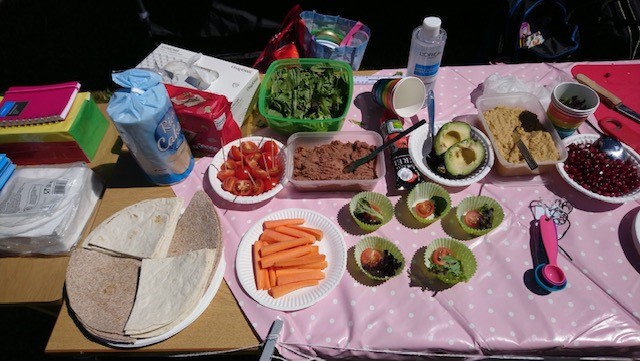
“People had the chance to taste the food before committing and went on to eat more…People were surprised they liked it and wouldn’t have had the opportunity to try it otherwise.”
“We used different types of vegetables from different parts of the world…everyone tasted vegetable dishes which were cooked differently according to their needs and requirements.”
This case study is a summary of one written by Veg Advocate Documenters from England. You can read the full case study and more in their blogs here.
The Queer Food Project is a mutual aid food sharing pilot project that tests out how to build local networks and communities through sharing food in Manchester. The Small Grant was used to organise the first in-person pilot by Queer Food Project. The simple aim was for a group of cooks to come together, share skills and nutritious veg packed meals for four weeks in a kitchen that can be hired by community organisations.
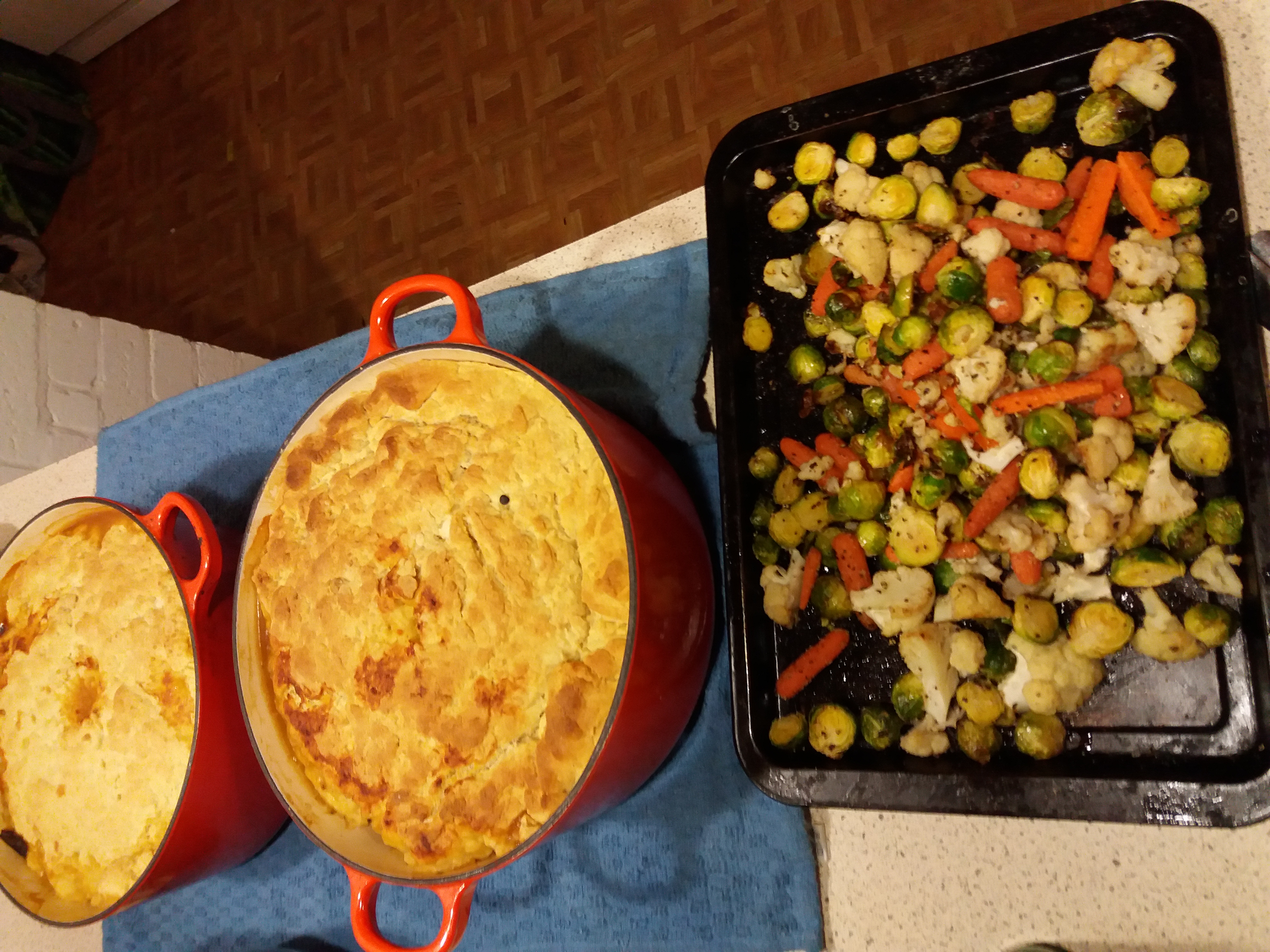
“I believe that cooking and eating together is good for physical and mental health, especially when in a safe space.” Veg Advocate based in Manchester."
Not having an appropriate venue or resources did prove challenging. Because venues changed, more time was needed to get to know the new kitchen and to work out how to use the equipment. The groups were also restricted by trying to fit in cooking and a social gathering into an allocated time slot by the venue and volunteers’ limited time.
Nonetheless, meeting in person in this relaxed environment with good food gave the group ideas for other projects that wouldn’t have happened without this activity. In December they held a Queer Mass Dinner with the lead cooks, and four of the people who had eaten the meals in November shared the responsibility of preparing and cooking a huge feast on Christmas Day. Over 25 people came to eat in person and the group delivered two meals to a couple who said they’d never had a Christmas dinner cooked for them.
Almost all the Veg Advocate activities included an element of knowledge sharing about veg. 24 activities carried the specific aim of promoting veg through different methods of food education, including workshops and demonstrations on cooking skills, the health benefits of veg, or information about where to buy and how to cook veg on a budget.
- Cooking demonstrations online and in person aimed to make vegetables more appealing, and accessible, by demonstrating how they can be included in meals. Veg Advocates showed a sensitivity to different palates and preferences, the cost of the meals they were preparing and cultural inclusivity, by letting participants taste before committing, and sharing recipes. Words like ‘simple’ and ‘easy’ were frequently used by Veg Advocates as a way of promoting their recipes.
- In workshops on healthy eating and the nutrition, rather than simply telling people what they should eat, activities created welcoming spaces for peer-to-peer education and conversation about food without people feeling stigmatised.
- Many activities aimed to make veg fun and exciting, especially activities engaging children. Veg Advocates utilised resources from Eat Them to Defeat Them, or created their own games, activities and resources to encourage participants to become familiar with and enjoy veg.
“The project increased knowledge of new veg and fruit by tasting, sensory experience, seeing it grow, planting the veg - it was all exciting for the children.”
“We filled the gaps of availability, accessibility and affordability by providing 60 meal kits for free but also educated attendees about the cheap, convenient and still good nutritional quality veg and pulses available from local discount stores.”
“Talking with the teen participants gave an insight into how the younger generation gets access to veg and their struggles with it.”
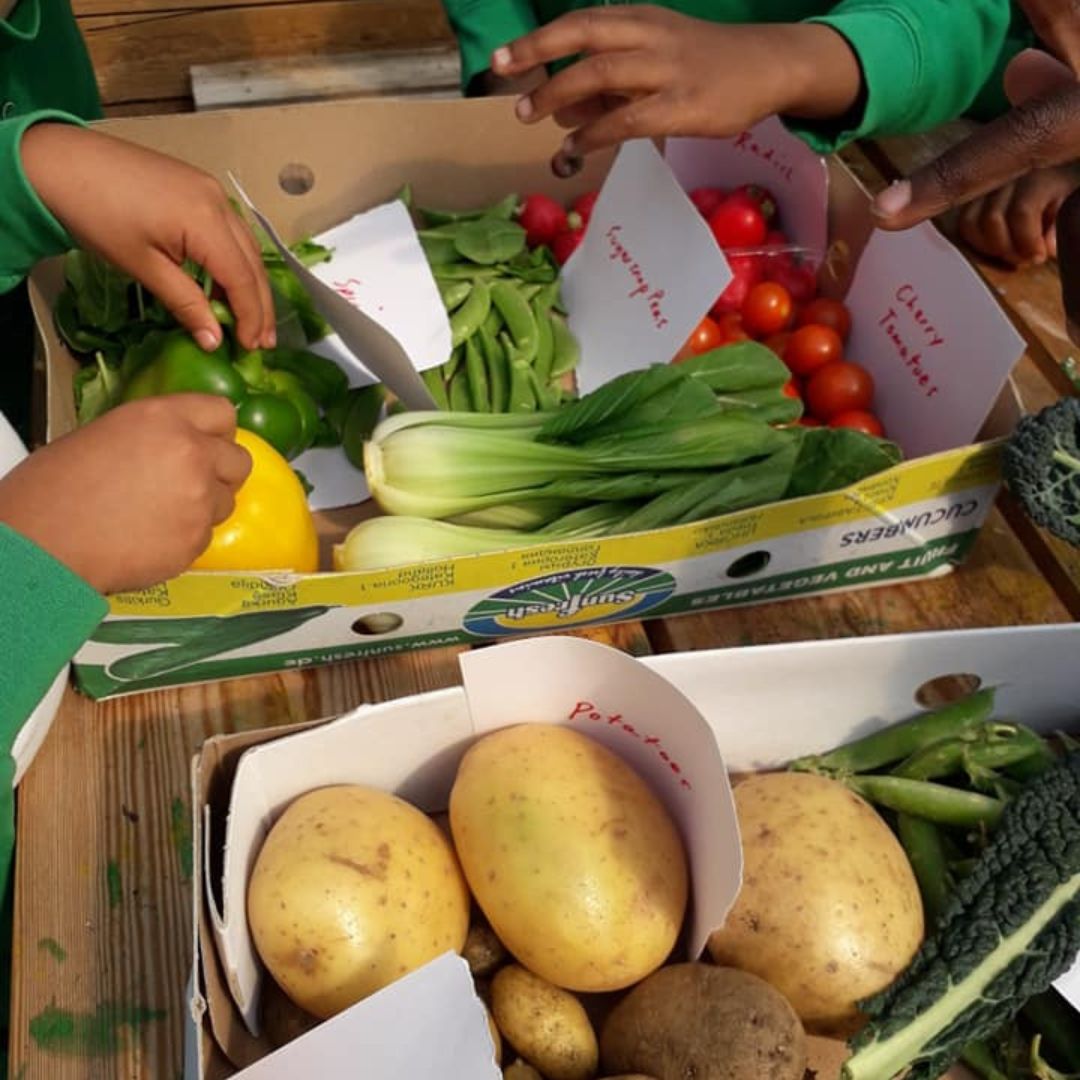
See here for more case studies and details of the activities delivered in Northern Ireland, produced by the Veg Advocate Documenters from Northern Ireland.
One Northern Ireland Veg Advocate delivered a two hour workshop involving a cook-a-long session providing educational and practical skills to build easy, veg rich meals throughout the week. Dishes included smoked paprika baked broccoli, sweet potato toast, carrot and cucumber ribbons and green herby dressing.
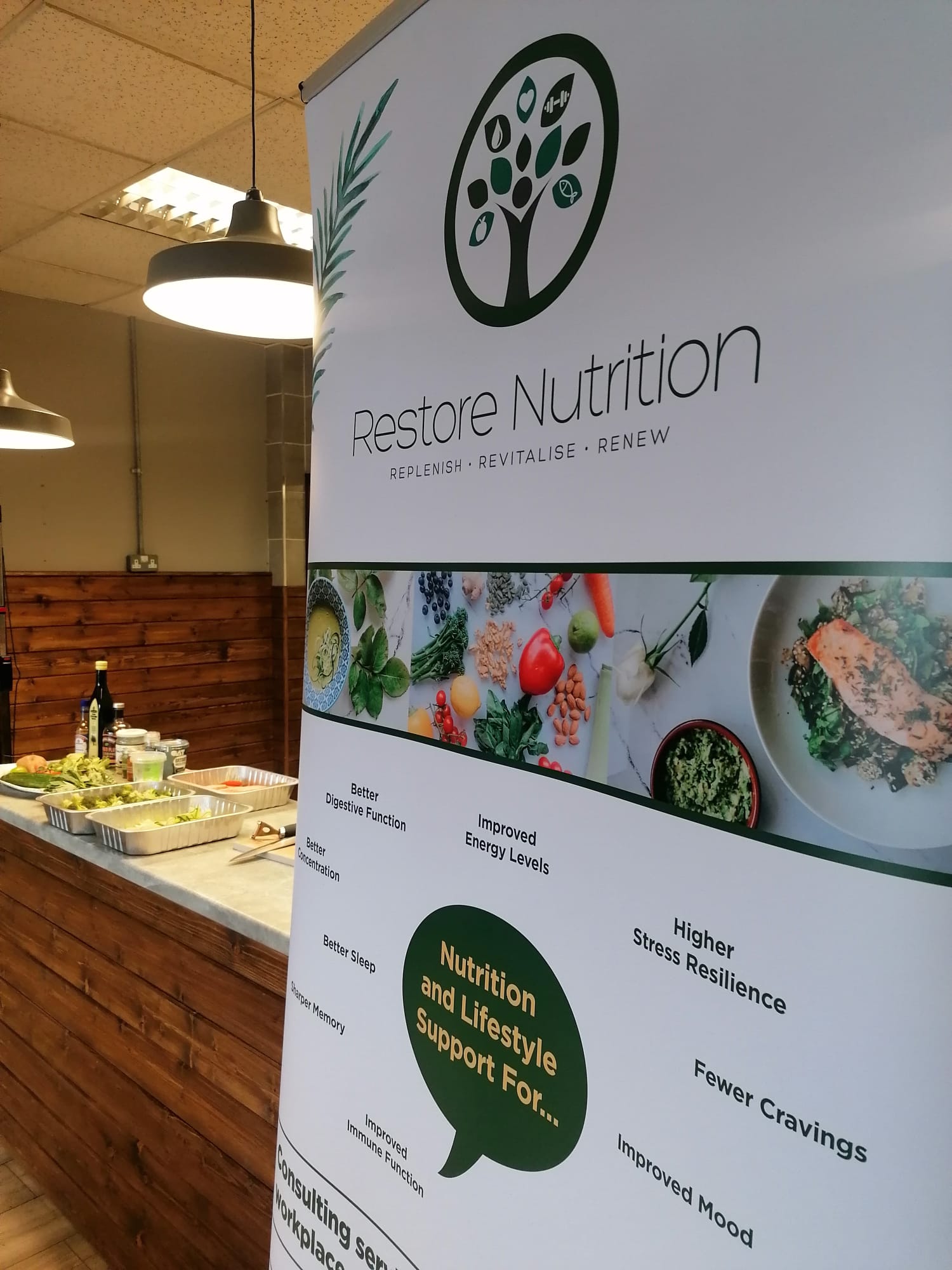
The activity aimed to address the time and cost barriers to eating veg, by demonstrating ways of cooking veg on a budget and using simple recipes, as well as making veg more appealing to participants.
“Most individuals I speak to are time poor and are struggling with the current rising cost of food. They don’t have time to spend lots of time in the kitchen every day.”
15 participants took part, all women aged between 20 and 60 years old, including parents and retirees. Whilst not everyone tried all of the veg options, everyone tried at least one thing.
“Lots of the participants commented that they had barriers with eating veg because of pre-conceptions that they didn’t like the look of them. They advised that the way we prepared the veg differently made them palatable and enjoyable for them.”
This Veg Advocate believes that this event could be easily rolled out across community groups if funding was available. In the meantime, they have gone on to join My Food Community and develop a 12-week food programme for people in their community.
What role does food education play in promoting veg consumption?
Food education initiatives, which provide information to try and change individual’s food choices, do play a role in improving people’s health, however these interventions are not enough on their own. The effectiveness of food education is limited compared to the influence on diets of food environments – that is the wider societal, economic and physical context which shapes the accessibility, availability, appeal and adequacy of food.
However, educational initiatives that aim to change dietary intake patterns can be varied, ranging from information provision to capacity building. Many of the Small Grant activities sought to educate communities on the benefits of eating veg. However, none of the activities involved simply telling participants what to eat, and then asked them to rely on willpower to carry out that advice. ‘Education’ was more often framed as a sharing of tips, recipes, ideas, food preferences and cultures – a two-way exchange that meant people could both contribute as well as benefit from new knowledge. Activities also took place in familiar settings where people felt safe and comfortable; they were tailored to the needs of individual community groups and aimed to remove any stigma when discussing their food choices.
Most importantly, these activities brought wider benefits beyond shifting diets. Many Veg Advocates reported that their activity helped create connections and build community, and often these broader societal benefits associated with the activities were given equal or greater emphasis in evaluation reports than changing attitudes to veg. The activities brought people together in ways that aimed to be fun and engaging; they helped people to learn new skills, whilst forming relationships within their communities. Food acted as a tool to bring people together, tackling social isolation, exacerbated by the Covid-19 lockdowns, and contributing to social cohesion and wellbeing.
14 activities involved participants in growing veg themselves or sharing seeds to encourage people to grow their own. Veg Advocates described how they believed this promoted veg consumption by showing people where it is available locally and for free. It also provided a way of talking about veg and familiarising people with where it comes from, in turn making veg more appealing to eat.
-
“I believe it helped make veg more accessible to people because they saw how easy it was to grow veg and herbs at home in small spaces.”
-
“Our garden group encourages those on site to forage – come out and pick your own. You don’t have to buy a head of lettuce, just pick a few leaves whenever you need them…It’s happening, people are taking what they need.”
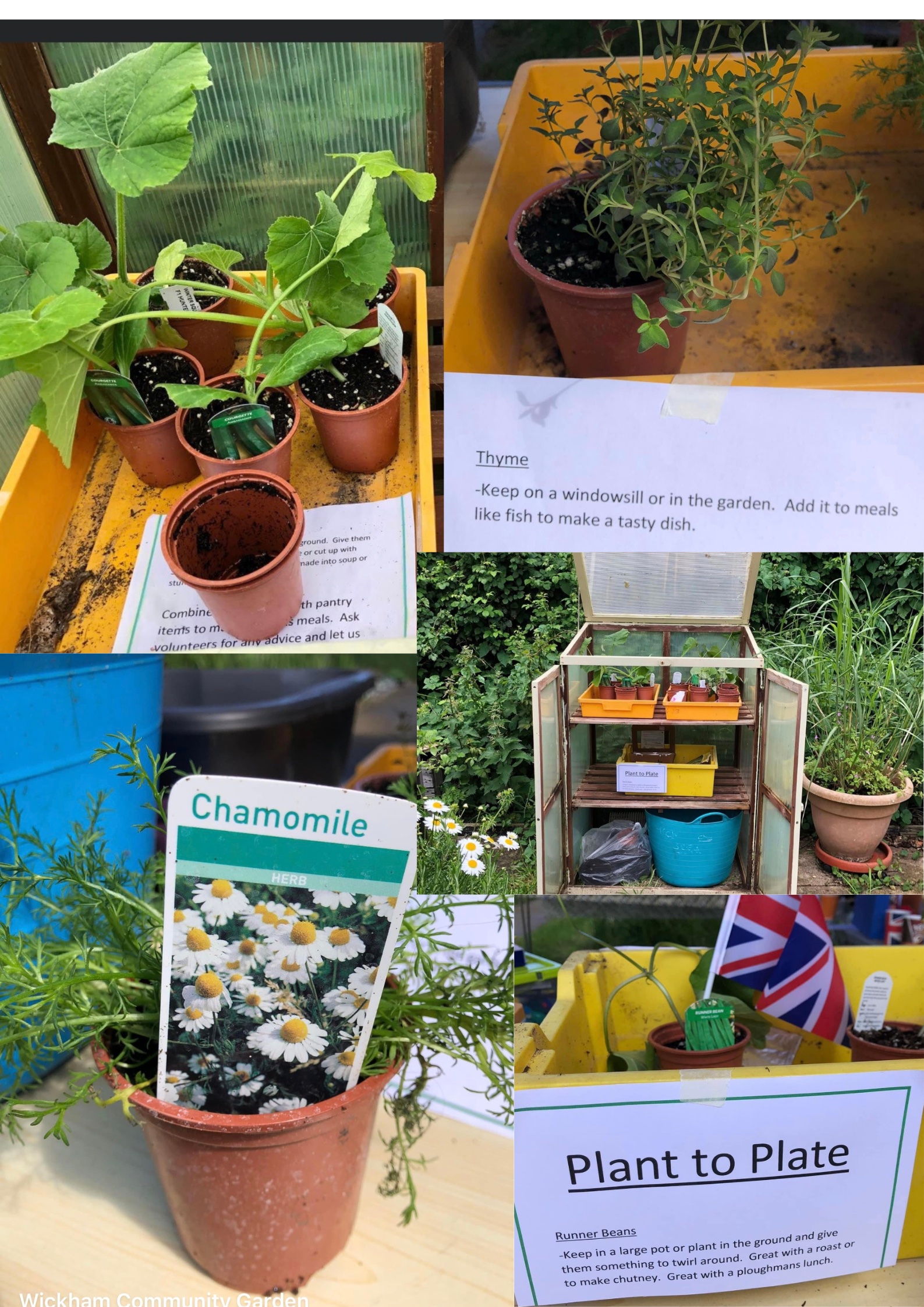
This case study is a summary of case studies written by Wales Veg Advocate Documenters. As part of the evaluation process of the Small Grants programme, they have produced an e-zine of the activities delivered in Wales, available here.
This Small Grant activity involved delivering a series of practical events over an eight-month period which included gardening and growing workshop once a month, a cooking demonstration in the National Eisteddfod in Tregaron, and pickling and preserving event. These events were open to all ages and abilities and were offered in Welsh and English.
All events were well attended, they were free and open to anyone, regardless of age or skills.
“It was mentioned a number of times that they [the participants] would like to attend more of these events, but if there was a charge then a number would not be able to attend, as they would not be able to afford it.” Wales Veg Advocate.
The event helped to remove the misinformation and misconception that you need a lot of room to grow your own veg and fruit. Participants could also take away a pot of pickled product, and bilingual instructions and recipes.
Unfortunately, due to poor weather, less veg than expected was grown. This meant produce had to be bought instead, increasing the overall project costs.
A total of 91 people (53 Adults, 38 Children) attended these seven different activities over the eight-month period.
This Veg Advocate is planning to repeat the growing, cooking and preserving events for the coming year “What was very evident was more of these events need to be planned and held, as well as other ideas need to be developed. These ideas include things such as working in partnerships with other organisations such as foodbanks, schools, family centres, churches and growing clubs.”
Perhaps one of the most prominent, but unexpected, outcomes of the Small Grants programme, was the opportunity that these grants provided for bringing communities together and enhancing wellbeing and social cohesion. This was particularly important in the wake of a series of COVID-19 lockdowns. Veg Advocates also felt it promoted veg consumption by giving people the space to talk about their food choices, learn and motivate each other.
-
“The project itself has brought members of this community closer together and new friendships have been forged.”
-
“Some people come for the company, the food and activities help them to start conversations with new people and it’s great to hear people talking about food.”
This case study is a summary of one written by Scotland Veg Advocates. The full version is included in their blog along with other case studies from the Small Grants activities here.
The Veg Hive initiative, Bee Healthy, was developed by three Scotland Veg Advocates, with the aim of increasing veg consumption and improving people’s relationships with veg. They held two interactive events with their local community centre, Greener Kirkcaldy pantry and pop-up cafe, for members of their community experiencing food insecurity.
These events involved simple and uncomplicated veg inspired activities using health promotion awareness tools, such as the NHS Eatwell Plate. The Veg Advocates wanted to understand what knowledge participants had of the Eatwell Plate and other health awareness schemes, and if these would be possible for them to use under their current financial circumstances.
They also wanted to make sure this was a welcoming environment. They handed out goodie bags containing their personally produced community recipe share booklet, with ingredients to make one of the meals, plus a copy of the ‘Why eat more seasonal veg?’ leaflet produced by another group of Veg Advocates in Scotland.
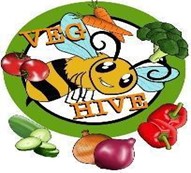
During the event, participants were also encouraged to complete their own personal pledge to continue to eat more veg. The events were received positively by the participants, who felt they learnt more about veg and were able to be open and discuss their insecurities around food with others in a safe space.
There were 45 participants in total between both events, most of the participants were families or older single adults, all of which were receiving benefits or on very low incomes.
“The overriding goal of the Veg Hive event was to engage with people who experience food insecurity who use a food pantry/hub/foodbank. We wanted to centre their accessibility and affordability to veg as well as to understand their relationship to vegetables and fruit.” – Veg Advocate, The Veg Hive Initiative
Business Engagement
The Veg Advocate programme aimed to create opportunities for citizens to bring their ideas and experiences directly to food businesses, working with them to come up with new ideas to tackle barriers to veg consumption. Our aim was to ensure that the actions taken by large food businesses to support access to veg are relevant to citizens’ lived experience, with citizen involvement helping to hold them accountable on their Peas Please commitments. Activities undertaken included:
‘Invegtigations’: Veg Advocates were asked by the Peas Please team to visit pledgers, in person or online, to investigate the businesses’ Peas Please pledge in action, and suggest what more could be done to make it easier for everyone to access and afford veg.
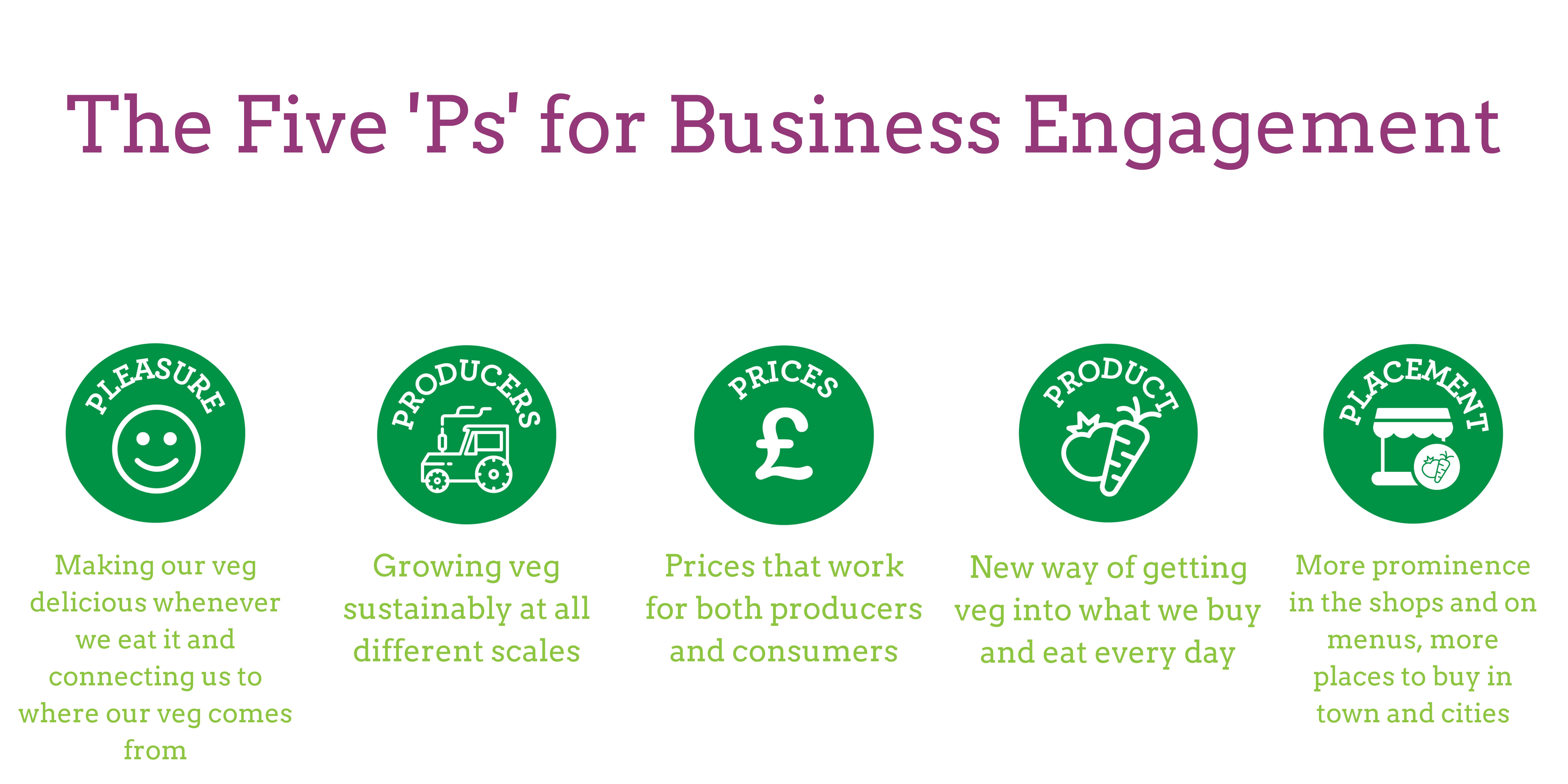
Veg Advocates recorded their feedback which was used during dialogues with retailers.
Retailer and food manufacturer dialogues: following the invegtigations, Veg Advocates met with representatives – from health and nutrition and Corporate Social Responsibility teams – who were Peas Please pledgers. This included Aldi, Co-op, Hendersons, Lidl, Sainsbury’s, Tesco and Waitrose, Birdseye, Castell Howell, Mars and Nestle.
One-off engagement with businesses: Two Veg Advocates in England, alongside The Food Foundation’s Adult Food Ambassadors, attended a listening session with Sainsbury’s, to discuss how the cost-of-living pressures were impacting customers. The discussion took place at Sainsbury’s HQ with senior representatives in attendance. Sainsbury’s provided direct feedback on the outcome of this session, explaining to us that based on an idea suggested by one of our Veg Advocates at this session, Sainsbury’s launched an affordable (£2) ‘Taste Me Don’t Waste Me’ fruit and veg box in over 200 of their stores.
Following a site visit by two Veg Advocates, and based on discussions that were had during that meeting, Castell Howell and Food Sense Wales started to work up a pledge that would involve increasing access to veg as well as increasing the volume sold into schools taking part in the Food and Fun scheme. This idea quickly developed into a pilot study in Cardiff in summer 2022. The pilot saw courgettes from Blas Gwent, a Wales-based agroecological grower being delivered to schools in Cardiff via Castell Howell with the support of Food Cardiff. The pilot project was undertaken over a period of three weeks during the Food and Fun summer programme across 29 Cardiff Primary schools engaging approximately 1500 children. Nearly 1 tonne of courgettes went through the supply chain and these were used by the school catering teams to create lunches as well as to engage children in cookery and other related activities such as courgette art. This pilot is now being extended this year (2023) and is being rolled out to schools in Monmouthshire, Carmarthenshire as well as Cardiff. Read the full report here.
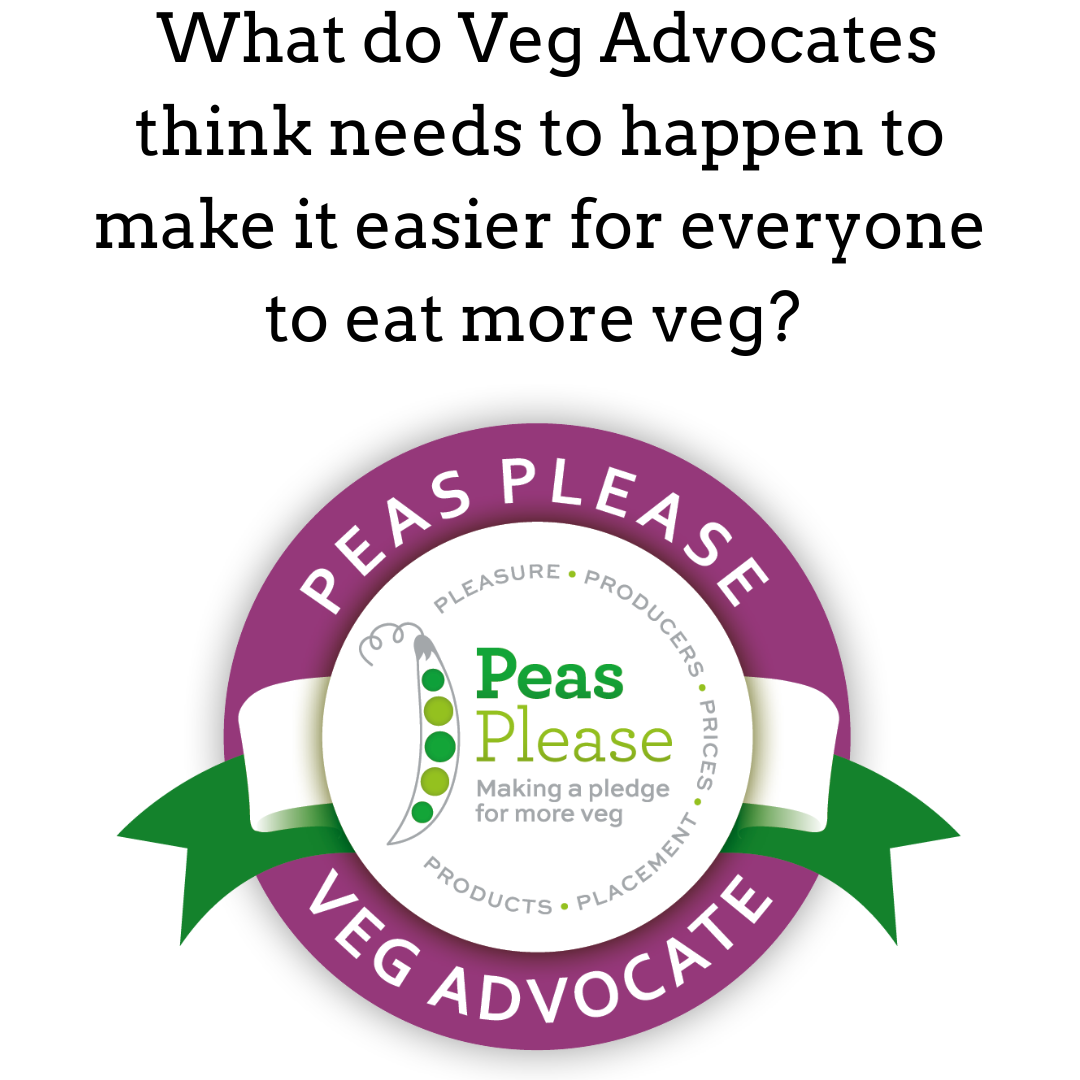
We know that the food environment has a huge impact on the food choices people make, and the suggestions from Veg Advocates on product placement, advertising and price reflected this. Most Veg Advocates also felt that retailers could play a role in educating shoppers to eat more veg, for example in meal planning, or providing recipes. Some of the key points discussed with retailers and manufacturers were:
Veg Advocates commented that there were sometimes shortages of fruit and veg in store at the end of the day and the week, but others praised the wide range of stock available. Some wanted to see more vegetables that would cater to different cultural preferences.
-
“Ensure that any recipes on the website and on social media are inclusive of different cultures as well as specific dietary requirements such as vegan/vegetarian diets.”
Veg Advocates were complimentary when veg was prominent and visible at the front of the store.
-
“The fruit and vegetables were on view by the entrance in both stores, so they were the first thing that you see.”
-
“Have frozen veg next to fresh, not at the other side of the store where some people won’t even go.”
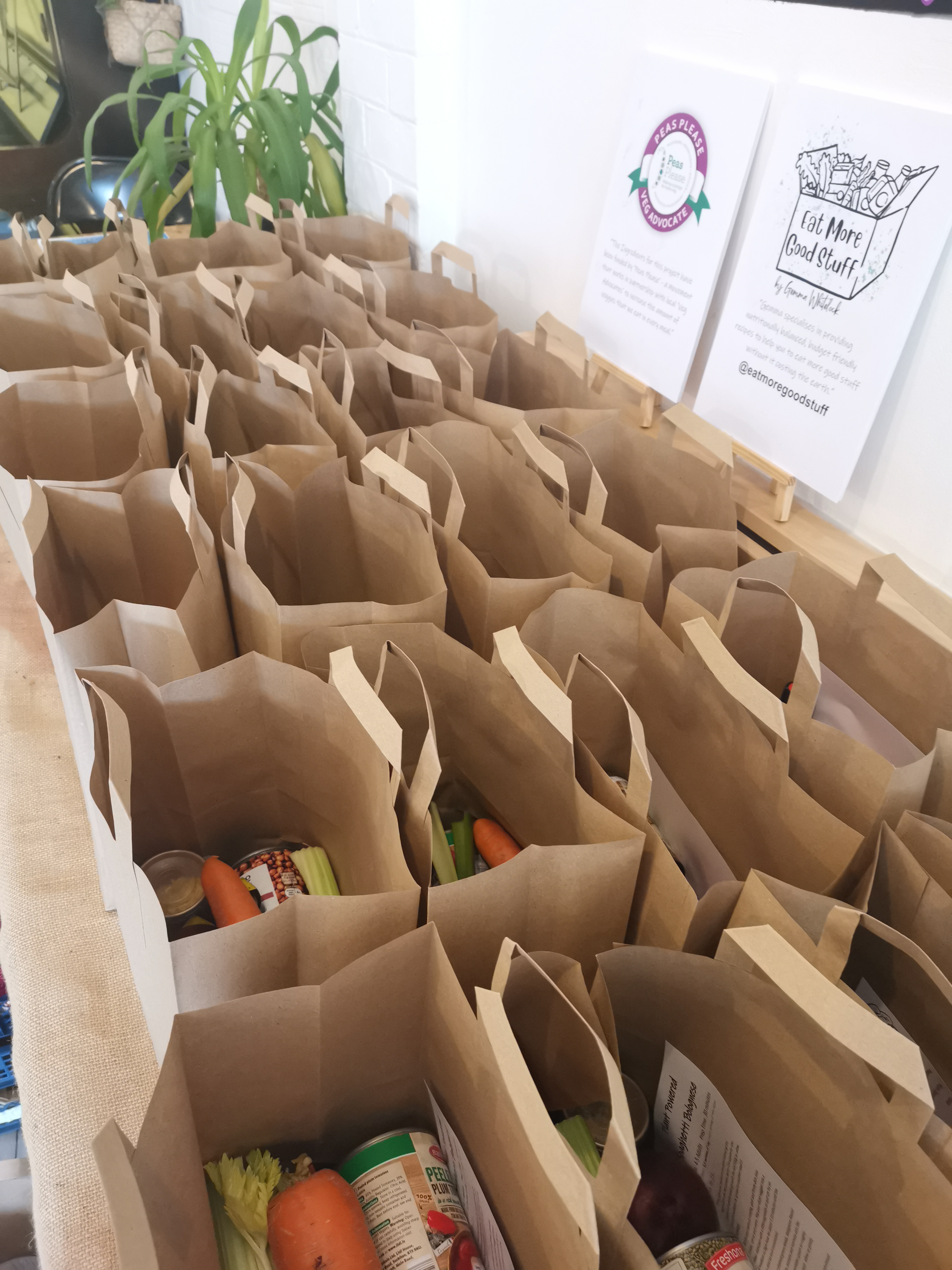
Suggestions included using social media more and taking part in national campaigns such as Zero Waste week. Veg Advocates highlighted inconsistencies between what was available in store and what was advertised online or through social media. Many Veg Advocates wanted to see retailers do more to push seasonality and British veg, such as extra points on loyalty cards when seasonal veg was purchased.
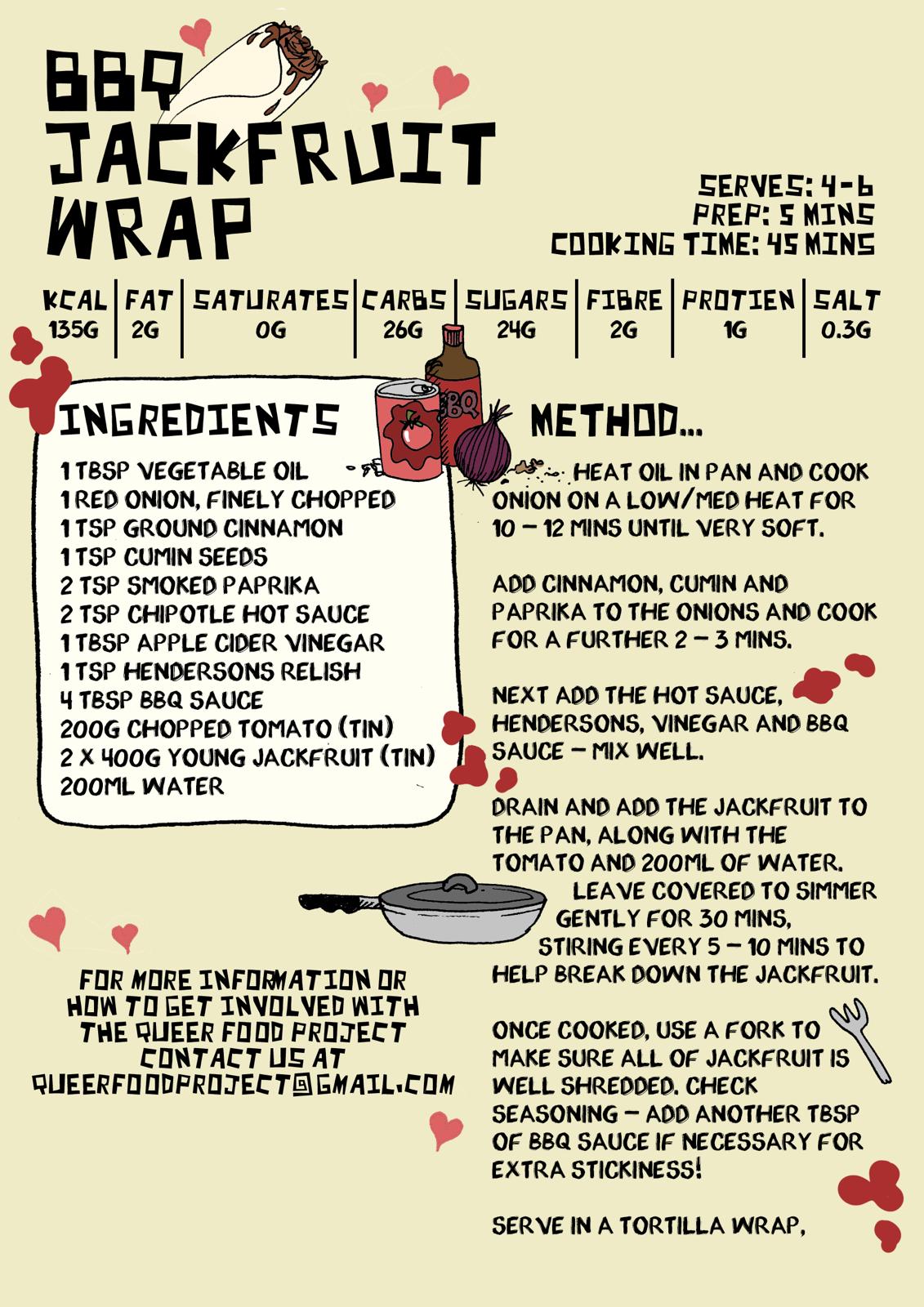
There was discussion of the veg content in plant-based options and how to make this more visible, as well as the range of plant-based options in store.
-
Veg Advocates were open to veg being made the star of dishes, or less visible too, reporting that they “feel it’s the retailers’ responsibility to take away the choice from people e.g. not offering the 100% meat option.”
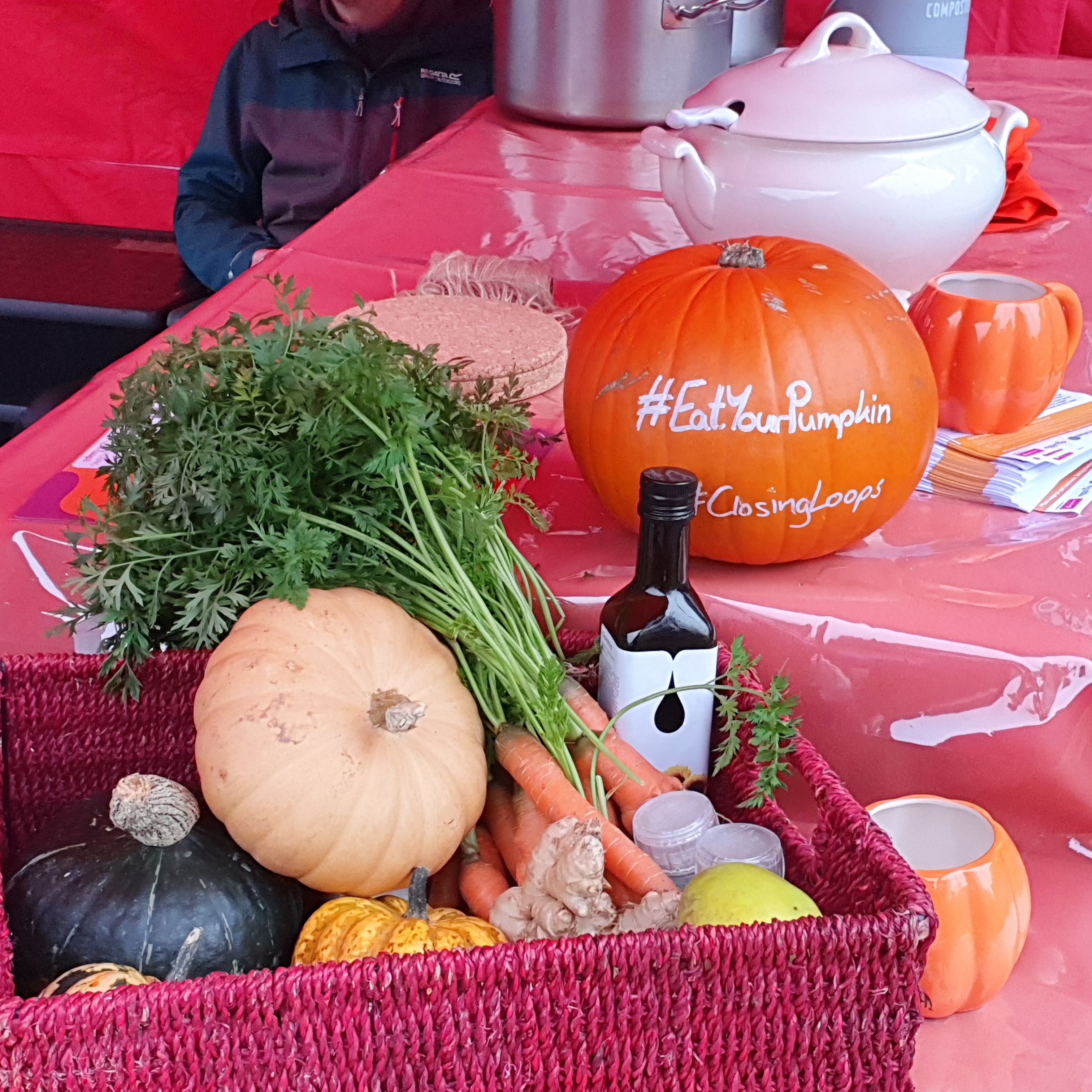
Veg Advocates scrutinised labelling, suggesting more details on the sourcing of vegetables and discussing how to make sure transparency on products is maintained even where veg are sold loose.
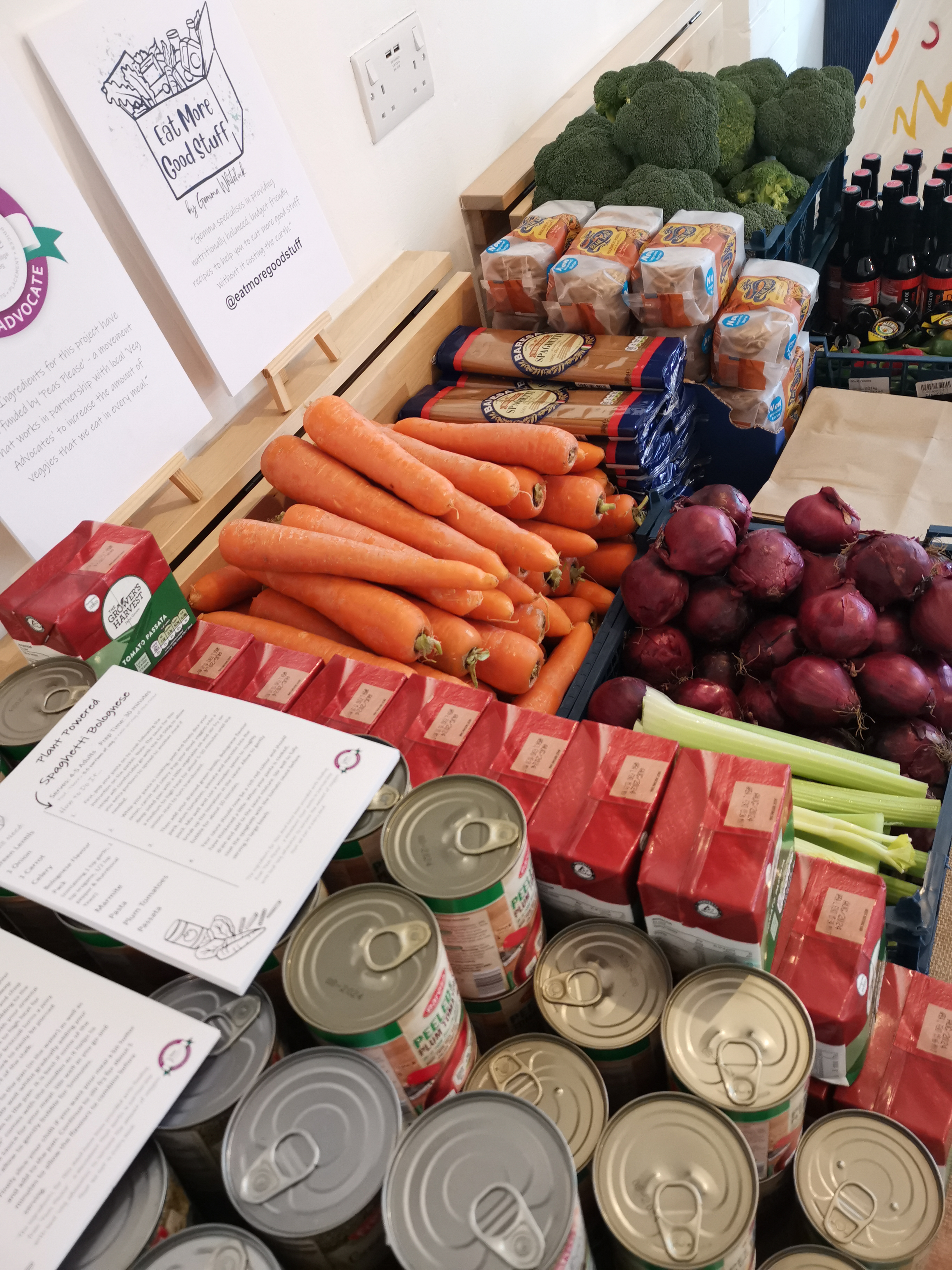
Business engagement: what have we learnt about meaningfully involving citizens?
Successes
The ‘invegtigations’, retailer and manufacturer dialogues led to rich, varied and interesting discussions about ways to promote veg. These were two-way conversations, with Veg Advocates offering suggestions, and representatives from businesses having the opportunity to ask questions and explain logistical challenges. Veg Advocates were supported with a brief and the Five ‘P’s framework that helped them to look for factors that we know influence food choices, giving them a useful framework for their suggestions.

Challenges
Veg Advocates felt that it was not always clear on how their suggestions or feedback to businesses had been taken on board. Following the dialogues there was no mechanism for businesses to report back on the actions that they committed to. Sometimes businesses provided direct feedback, which was appreciated, but this was voluntary and intermittent.

Food activists - Creating a network
The Veg Advocate programme sought to create a new generation of food system agents of change, through forming networks and cultivating advocacy. Through support from the Peas Please partners we wanted to ensure that Veg Advocates felt:
- Informed about the causes and consequences of low veg consumption across the UK.
- Motivated to take action to make it easier for people to eat more veg.
- Connected and supported by each other, so that they could share ideas.
Through onboarding webinars and ad hoc online and in person events, we explored with the Veg Advocates the challenges of the food environment and barriers to eating more veg. We shared resources including ‘Veg Facts’ and connected Veg Advocates to experts for advice.
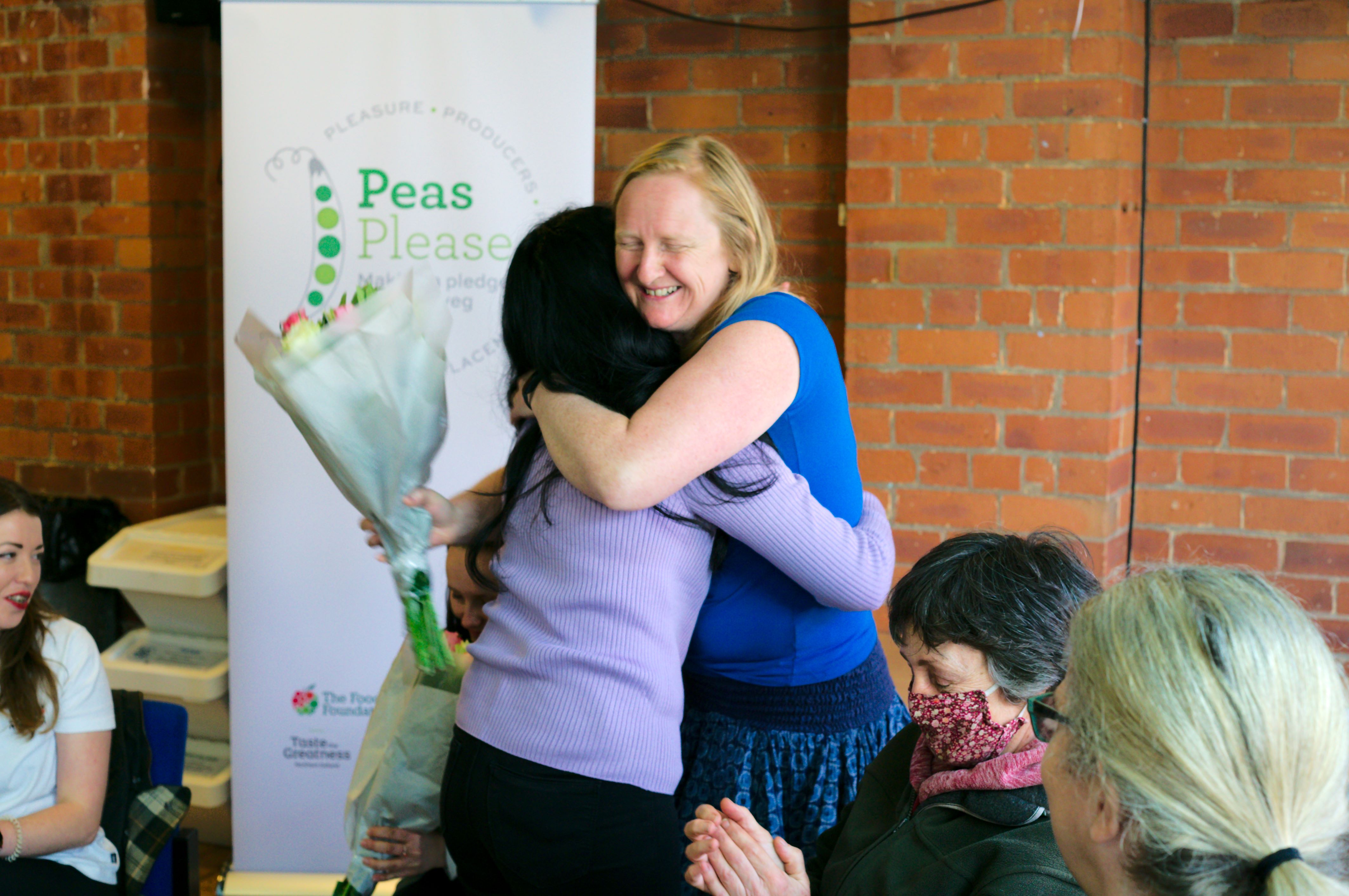
Creating a network: What do Veg Advocates think needs to happen to make it easier for everyone to eat more veg?
Some Veg Advocates were already involved in food-system research, campaigning, or activities in their local area. However, an onboarding survey of 92 Veg Advocates found that almost 70% of respondents reported not feeling like they had a say in determining what veg are available in their communities, as well as the quality of veg available (just over 70%). Almost 60% reported not having done anything in their communities to try change the availability or quality of veg prior to joining the Veg Advocate programme.
These survey findings indicate that the Veg Advocate programme provided a structured opportunity for people passionate about food system change, who hadn’t otherwise been involved in this kind of work. In focus groups carried out at the end of the programme, Veg Advocates reported that they liked the hands-on and practical approach of Veg Advocate programme, and that it brings formality and structure to help move people to action and bring about change.
What have we learnt about how to meaningfully involve citizens?
Successes
by far the most valuable means of informing and motivating the Veg Advocates was through bringing them together. The feeling of connectedness that the Veg Advocate network brought participants came up repeatedly during focus groups. Although there was a general feeling that more in-person opportunities to meet would have been beneficial, there was recognition from Veg Advocates that this was not always possible given the pandemic.
Networks were both made and expanded: Scotland’s Veg Advocates reported feeling like they have learned more about veg and veg advocacy, had been able to teach this to others, as well as involve others in their efforts. England Veg Advocates said they felt less alone and more empowered, and that the Veg Advocate programme as a movement had immeasurable value in and of itself.
As well as participating in our own Peas Please activities, Veg Advocates were also connected to new opportunities for food activism and networks through the programme, including Veg Cities, their local Sustainable Food Partnerships, and the My Food Community leadership programme. In Scotland three Veg Advocates were recruited to be part of a ‘Meaningful Panel Participation’, with the aim to advise those making policy decisions (Local Food Plans) on what meaningful public participation means in food systems decision-making. This includes decisions about how we improve the way we produce food and how we ensure that everyone can access and afford high quality, nutritious, sustainable, and culturally appropriate food with dignity and choice.

Challenges
Engaging Veg Advocates involved a dedicated member of staff from each of the Peas Please partners. Although 180 Veg Advocates were originally recruited, not all continued to engage (which was not unexpected given the high numbers recruited and the disruption to many people’s lives caused by Covid-19) and most did not participate in any in-person activities. By June 2023, 47 Veg Advocates continue to be very engaged, e.g. participating in events and other volunteering opportunities, responding to newsletters and sharing information on whatsapp groups and Facebook, with a further 35 occasionally engaging.

Conclusion and Recommendations
The Veg Advocate programme sought to offer citizens opportunities to advocate for food system change, from within their own communities, to businesses and at a policy level. We would recommend that similar programmes place citizens, and their lived experience, at the centre of their advocacy efforts. The Veg Advocate programme has been essential to the overall Peas Please programme, contributing creativity and impact at a community level.
Recommendations for civil society
-
Community organisations and non-governmental organisations can be instrumental in facilitating networking opportunities between food activists and fostering opportunities for sharing learning.
-
Micro-funding opportunities, in the right hands, have huge potential to pilot what works in improving local food environments. Support needs to be in place to measure the impact of these grants.
-
Even citizens passionate about changing the food system will be unable to maintain consistently high levels of engagement for the duration of long-term projects. When developing food advocacy programmes, a variety of activities should be available that offer varying levels of commitment for citizens to engage with.
Recommendations for local and national policymakers
-
Our evaluation suggested that the Veg Advocate programme did not offer enough opportunities for citizens to advocate to local or national policymakers, and we believe more mechanisms need to be established to ensure citizens are shaping policy as it is being developed and implemented e.g. through consultations or Citizen Assemblies.
-
Local action to promote veg, including communal meals, growing spaces, cook-a-longs and other forms of peer-to-peer food education needs consistent funding, as well as improved resources to monitor their reach and impact. Local authorities should be linking their social and community programmes with food focussed initiatives.
Recommendations for businesses:
-
Businesses need to consistently engage with citizens to understand the barriers many citizens face in accessing and affording veg, and to establish mechanisms to demonstrate how they have responded to feedback.
-
We would recommend using an external independent facilitator in focus groups with citizens.
-
Businesses need to be more transparent on sales of vegetables, e.g. publishing these in annual Corporate Social Responsibility reports, to support greater transparency and demonstrate accountability.
Acknowledgements
A huge thank you to all the Veg Advocates who participated in this programme. Your passion for improving the food system, helping your communities and sharing what you have learnt with each other has been inspiring. You have brought a valuable range of perspectives and knowledge to enrich the Peas Please partnership and to progress our mission. Thank you for your time and dedication!
Special thanks goes to the 10 Veg advocates who worked with us as documenters, gathering the evaluation forms for Small Grants Programmes that have informed Chapter 5 of this report, and for creating captivating and inspiring case studies about these activities, which we have referenced in this report and are also available here.
Thank you to Mark Spires, Senior Research Fellow at the Centre for Food Policy at City University. Mark has been a critical friend' to the Veg Advocate programme, leading facilitation of the Photo Exhibition workshop, and conducting surveys and focus groups with Veg Advocates that have directly informed this report.
Thank you to all the Peas Please Partners who have worked alongside The Food Foundation - Nourish Scotland, Nourish NI and FoodSense Wales- including the Peoples Engagement Team, Pearl Costello, Irina Martin, Michelle Grimes and Caz Falcon, for you work engaging and supporting Veg Advocates in each nation throughout the programme.
Thank you to Amber Wheeler, Previously People's Engagement Manager at The Food Foundation who developed The Veg Advocate programme, and to Sophie Peters and Portia Woods, who both worked as Veg Advocate Support Officers at The Food Foundation.
Finally, a huge thanks to our funder, The National Lottery Community Fund (UK Programme) for making all our work possible.


